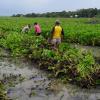Negotiations at the COP23 climate change conference have been slow, but some progress has been made. The ACT Alliance, along with leadership from the World Council of Churches (WCC) and the Lutheran World Federation (LWF), who together have combined constituencies of more than half a billion Christians worldwide, have been proactive throughout COP23 calling for action by governments on climate change. Alone, denominations like the CRC and organizations like World Renew or Young Evangelicals for Climate Action might get lost in the lists of interested parties. But when many faith-based organizations join hands to work together under large alliances like ACT, LWF and WCC, we have stronger ideas based on the wisdom and experience of a greater group. In this way our influence has a more definite impact. Likewise, groups like the ACT Alliance only exist to the degree that their members like World Renew share leadership and do their part to accomplish the goals of the larger group. The task of climate change advocacy is too big for one person or organization to carry but there is strength when we come together.
The task of climate change advocacy is too big for one person or organization to carry but there is strength when we come together.
ACT Alliance is a coalition of more than 140 churches and church-related organisations working together in over 100 countries to create positive and sustainable change in the lives of poor and marginalised people. They join together to support vulnerable communities and families regardless of religion, politics, gender, sexual orientation, race, or nationality. Wherever they work and whoever they are working with, they hold one another accountable to hold to the highest international codes and standards. As an Alliance (of which World Renew is a member), ACT represents 25,000 staff from member organisations and mobilises about $1.5 billion for its work each year. Member organizations are all deeply rooted in the communities where they serve and together they earn the trust and respect of local people long before disaster or famine responses make news headlines. They also remain steadfast in their grassroots commitments for many years after world attention has shifted elsewhere.
Because climate change has an impact on human rights and on many other aspects of community change initiatives, like health and nutrition, agriculture, and clean water, ACT stresses that climate policies must keep human rights and all other community goals in mind. Policies that move towards sustainable energy or that help countries adapt to changes in weather or loss of coastal land must not harm human rights. On the contrary, they should help to respect, protect, and fulfill the human rights of all people who will be impacted by climate change and policies that seek to respond to this global challenge.
Negotiators must not forget what climate negotiations are really about – people and communities all across the world, whose lives are in serious jeopardy as a result of climate change.
This is why faith voices and larger groups like the ACT Alliance are an important part of this process. Together, we are calling for states to be accountable to these principles of human rights and sustainable community development. Together, we work to ensure that smaller or marginalized communities are not ignored as policymakers move forward.
In the words of Rudelmar Bueno de Faria of ACT Alliance: “We do not want COP23 to be a lost opportunity. The hopes and aspirations of millions of people who are facing the harshest impacts of climate change depend on urgent actions to mitigate climate change and its impacts. While this is a ‘technical’ COP, negotiators must not forget what climate negotiations are really about – people and communities all across the world, whose lives are in serious jeopardy as a result of climate change.”
I have increased confidence in our ability as World Renew and the broader CRC, along with these coalitions, to continue to be faithful influencers, for the sake of marginalised people and communities worldwide.
As a member of this year’s COP 23 ACT Alliance team, I was simultaneously encouraged and challenged. I was struck by the sheer number of ACT Alliance climate change advocacy staff, their multi-cultural, multi-skilled, organized, and highly professional team efforts, and last but not least, their passionate and committed attitude towards climate change advocacy. Having also spent time in North America with passionate, gifted CRC advocates, I have increased confidence in our ability as World Renew and the broader CRC, along with these coalitions, to continue to be faithful influencers, for the sake of marginalised people and communities worldwide.




The Reformed family is a diverse family with a diverse range of opinions. Not all perspectives expressed on the blog represent the official positions of the Christian Reformed Church. Learn more about this blog, Reformed doctrines, and our diversity policy on our About page.
In order to steward ministry shares well, commenting isn’t available on Do Justice itself because we engage with comments and dialogue in other spaces. To comment on this post, please visit the Christian Reformed Centre for Public Dialogue’s Facebook page (for Canada-specific articles) or the Office of Social Justice’s Facebook page. Alternatively, please email us. We want to hear from you!
Read more about our comment policy.